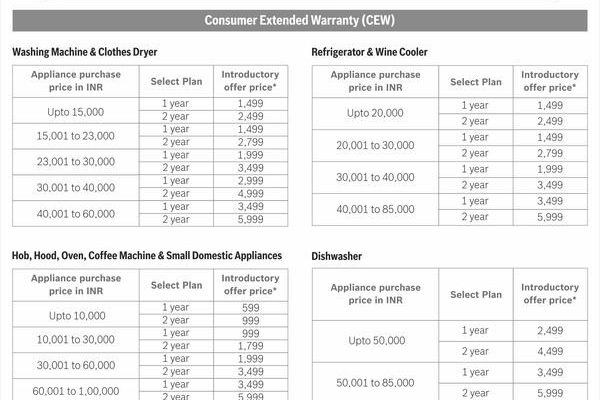
Think of your Bosch refrigerator like a reliable car. It’s built tough, but eventually, you might need a new battery, brakes, or some unexpected repairs. Buying an extended warranty is kind of like buying a roadside assistance plan—it offers peace of mind, but it might not always get you the full value if your ride stays smooth. So, how do you figure out if this “insurance” for your fridge is smart or just extra spending? Let’s break it down, step by step.
What Does an Extended Warranty for Bosch Refrigerators Actually Cover?
When you purchase a Bosch refrigerator, it usually comes with a manufacturer’s warranty that lasts for about one year. That’s your basic safety net—it covers defects in materials and workmanship. But an extended warranty kicks in after that, lengthening your coverage for several more years depending on the plan.
Here’s the thing: extended warranties often cover repairs for things like the compressor, cooling system, ice maker, and digital controls—which can be expensive to fix out of pocket. If the fridge stops cooling, or the motor burns out, an extended warranty can save you hundreds or even thousands on repairs.
But not all extended warranties are created equal. Some only cover certain parts, while others might exclude routine maintenance or damages caused by accidents or misuse. Before you buy, it’s important to carefully read what’s included and what’s not. Otherwise, you might end up paying for a safety net with holes in it.
How Reliable Are Bosch Refrigerators Without Extended Warranty?
Bosch has a solid reputation for making reliable appliances, and their refrigerators are no exception. Many owners report that their Bosch fridges last well beyond the typical lifespan without major issues. Honestly, this brand builds its products to run efficiently, often with smart features that help diagnose and prevent problems—like error codes that let you troubleshoot before something breaks.
That said, no appliance is bulletproof. Electronics can fail, seals can wear out, or things like compressors can go haywire after years of use. The question becomes: how likely is it that your Bosch fridge will need costly repairs soon enough to justify an extended warranty?
If you treat your fridge well—cleaning coils, avoiding overloading, and keeping the door seals tight—the chance of needing expensive repairs early on drops. Still, it’s not impossible. If you want to play it safe, an extended warranty is a way to hedge your bets.
Cost vs. Benefit: Crunching the Numbers
Here’s where things get interesting, and a little math-y. Extended warranties often run between $150 to $500 or more, depending on the coverage length and what parts are included. On the surface, it feels like a lot. But compare that to the potential cost of a compressor replacement, which can be upwards of $1,000, and suddenly the warranty starts to look like a bargain.
That said, many fridges don’t need those big repairs during their lifetime. So, you might pay for a warranty and never use it—kind of like paying for a gym membership and only going once. It’s a tradeoff between peace of mind and a bit of a gamble.
One way to think about it: if you’re the type of person who hates surprise expenses and values hassle-free repairs, the extended warranty might be worth it. But if you’re handy or like troubleshooting minor issues yourself, you might save more by skipping the warranty and setting aside a “repair fund” instead.
What Are Some Common Problems with Bosch Refrigerators?
Bosch refrigerators tend to be pretty robust, but that doesn’t mean they’re immune to typical appliance hiccups. Some of the most common issues owners face include:
- Cooling problems: Sometimes the fridge doesn’t cool properly due to a faulty compressor or thermostat.
- Ice maker glitches: Issues syncing the ice maker to the cooling system or problems with water flow can cause failures.
- Door seal wear: If the fridge door seal wears out, it can cause cold air to escape, pushing your fridge to work harder.
- Control panel errors: Bosch models often have digital controls that might need a reset or troubleshooting for syncing problems.
When these problems arise, they can range from simple fixes—like resetting the control panel—to costly repairs, like replacing a compressor. If you end up needing professional help for troubleshooting or repair, the extended warranty could save your wallet.
Alternatives to Extended Warranty: DIY and Maintenance Tips
You might be wondering if there’s a middle ground between buying an extended warranty and rolling the dice without any protection. Luckily, there are some hands-on ways to keep your Bosch fridge in top shape.
- Regular cleaning: Dusting off coils and checking door seals can prevent wear and tear.
- Troubleshooting error codes: Many Bosch models display error codes. Learning to read and reset these codes can save you a service call.
- DIY minor fixes: Changing water filters, re-syncing ice makers, or replacing batteries in remote/digital controls might be easier than you think.
- Scheduling professional maintenance: A yearly appliance checkup can catch small issues before they balloon into expensive repairs.
Taking charge of maintenance reduces the chance you’ll need costly repairs. And if something bigger does go wrong, you’ll at least have postponed it, letting you decide more calmly whether to repair or replace.
Should You Get an Extended Warranty Based on Your Usage and Lifestyle?
Here’s the thing: everyone’s needs are different. If you have a large family, rely heavily on your fridge, or want to avoid any downtime, an extended warranty might feel like a stress-free way to protect your investment. It’s kind of like wearing a helmet when you bike—you hope you never need it, but you’re glad it’s there.
On the flip side, if you use your fridge lightly or don’t mind rolling up your sleeves to fix minor problems, you might prefer saving that warranty money for a rainy day fund.
Also, consider how long you plan to keep the fridge. If you’re likely to upgrade in a few years, an extended warranty might not pay off. But if you want to stretch your Bosch fridge’s life to the max, extended coverage could be a smart move.
How to Decide If an Extended Warranty Is Right for Your Bosch Fridge
Ultimately, deciding whether an extended warranty is worth it boils down to your comfort level with risk, your budget, and how much you value peace of mind. To make a clearer choice:
- Check your Bosch model’s reviews: See if there are common issues reported by other owners.
- Review the extended warranty terms: What’s covered? What’s excluded? Are service calls included?
- Calculate potential repair costs: Look up average costs for typical Bosch refrigerator repairs to weigh against warranty price.
- Consider your personal factors: How much hassle can you tolerate? Are you handy with troubleshooting or do you prefer simple solutions?
Here’s a little rule of thumb: if the extended warranty costs less than half of a major repair and covers those big-ticket fixes, it’s probably worth it. But if it feels expensive and limited, you might be better off saving that money and learning a bit about troubleshooting instead.
Remember: an extended warranty isn’t a magic shield, but a financial tool. Know what it can and can’t do before you commit.
Wrapping It Up: Making Peace With Your Bosch Refrigerator’s Future
So, is an extended warranty worth it for Bosch refrigerators? Honestly, it depends on what kind of fridge owner you are. Bosch makes reliable, well-built fridges, but repairs can get pricey. An extended warranty can ease the pain of unexpected expenses and keep you from stressing over troubleshooting, especially with those fancy digital controls and sync features.
On the flip side, if you’re comfortable with basic maintenance, willing to troubleshoot error codes, or just don’t mind setting aside some money for repairs, you might skip the warranty and still come out on top.
At the end of the day, whether you buy that extra coverage or not, treating your Bosch fridge with a little care—like cleaning the coils and keeping seals tight—will go a long way. Because no matter what, the goal is the same: keeping your kitchen humming smoothly and your groceries fresh without breaking the bank.
